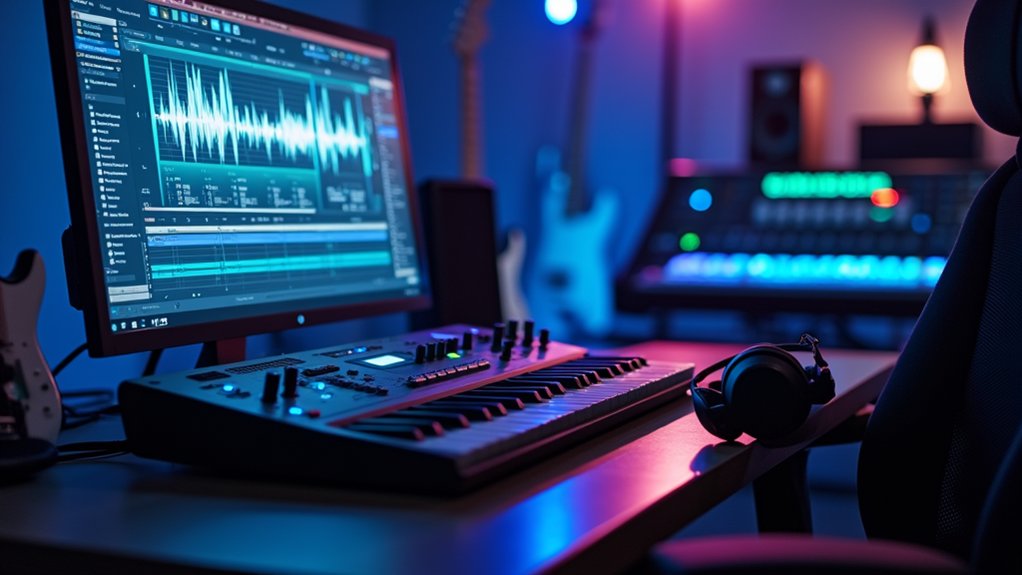Can AI Generate Songs?
Yes, AI can generate songs. Modern AI music generators like Suno AI, AIVA, and Google’s MusicLM utilize sophisticated machine learning models to analyze musical patterns and create original compositions across different genres. These systems can produce complete tracks or isolated elements like vocals and instrumentation. Currently valued at $3.9 billion, the AI music market addresses needs from content creators, advertisers, and filmmakers, though ethical and legal challenges concerning copyright and authorship remain significant considerations in this rapidly evolving field.

How artificial intelligence revolutionizes music composition has become a pivotal question in both creative and technical spheres. The global AI music market, currently valued at $3.9 billion in 2023, is projected to reach $38.7 billion by 2033, representing a robust 25.8% compound annual growth rate. This remarkable expansion underscores the increasing incorporation of algorithmic composition systems into both professional and amateur music production workflows.
AI music generators function through sophisticated machine learning models that analyze existing compositional patterns, harmonic structures, and genre-specific characteristics to produce original musical content. Systems like Suno AI, AIVA, and Google’s MusicLM employ variants of language models and neural networks that process textual prompts, lyrical inputs, or genre descriptors before generating complete tracks or isolated stems including vocals, bass lines, and accompanying instrumentation.
These technologies serve diverse use cases across multiple sectors. Content creators utilize AI-generated compositions for YouTube videos and podcasts, while commercial entities produce customized advertising soundtracks without traditional studio expenses. Independent filmmakers increasingly rely on tools like ComposerPro for synchronized scoring, and educational institutions incorporate these platforms into composition theory curricula. These tools significantly reduce dependence on session musicians and eliminate costly studio rentals for many projects.
For professional songwriters, AI music generation presents a complex duality of opportunity and disruption. While these systems automate technical aspects like mixing and arrangement—potentially freeing artists to focus on creative conceptualization—they simultaneously raise significant concerns about human replacement in specialized markets. The collaborative potential between AI and human composers continues to progress through co-writing arrangements and experimental applications. AI helps musicians overcome creative blocks by suggesting innovative chord progressions and melodic variations.
Emerging trends in AI music generation include blockchain incorporation for decentralized ownership models, personalization features adapting to individual user preferences, and multimodal input systems accepting both textual and visual prompts. However, these advancements introduce substantial ethical and legal challenges, particularly regarding copyright frameworks and intellectual property rights for machine-generated content. The music industry has responded with legal actions, as evidenced by the RIAA filing a class action lawsuit against Suno for alleged copyright infringement.
As the technology continues to mature, questions of authorship attribution, commercial licensing, and creative authenticity remain at the forefront of industry discourse.
Frequently Asked Questions
How Do Copyright Laws Apply to Ai-Generated Music?
U.S. copyright law denies protection for fully AI-generated music lacking substantial human authorship.
Copyright eligibility requires demonstrable human creativity through intentional modifications, creative control, or meaningful arrangement of AI outputs. Simple text prompts are insufficient to establish authorship.
Courts evaluate works case-by-case, focusing on human contribution rather than AI involvement. Without copyright protection, AI-only songs cannot be legally monetized or protected from infringement, prompting industry shifts toward human-AI collaborative tools and alternative protection mechanisms.
Can AI Create Songs in Specific Artist Styles?
AI systems can indeed replicate specific artist styles through style transfer algorithms that analyze distinctive vocal characteristics, instrumental patterns, and composition structures.
Current platforms like Suno employ sophisticated neural networks to mimic signature elements like an artist’s phrasing, tonal qualities, and production techniques.
However, this capability raises significant legal concerns regarding derivative works and potential violations of artists’ intellectual property rights, especially when the mimicry becomes commercially indistinguishable from the original artist’s work.
What Technical Skills Are Needed to Use Music AI Tools?
Using music AI tools requires a mixture of technical capabilities including programming skills in Python and knowledge of machine learning frameworks like TensorFlow or PyTorch.
Professionals should possess audio engineering expertise with DAW systems and understand MIDI protocols.
Data management abilities for handling large audio datasets, familiarity with music theory concepts, and experience with specific AI platforms like AIVA or LANDR complete the necessary skillset for effective implementation.
How Do Musicians Feel About Ai-Generated Songs?
Musicians hold diverse perspectives on AI-generated music, with opinions broadly divided into two camps: those viewing AI like a collaborative tool for idea generation, and others perceiving it like a threat to authentic creative expression and employment opportunities.
Research indicates significant audience concern, with 67% changing opinions about songs upon learning vocals were AI-generated.
While some creators embrace AI’s democratizing potential, many express apprehension about industry devaluation and the perceived soullessness of AI-created content.
Will AI Replace Human Songwriters and Composers?
While AI shows significant capability in song creation, complete replacement of human songwriters and composers remains unlikely.
Instead, a hybridized ecosystem is emerging where AI serves as a collaborative tool rather than a substitute.
Commercial sectors utilizing background music face higher disruption potential, while original artistic expression maintains human advantage.
Market projections indicating 25-30% CAGR suggest amalgamation rather than replacement, though regulatory frameworks must develop to address potential revenue impacts for human creators.